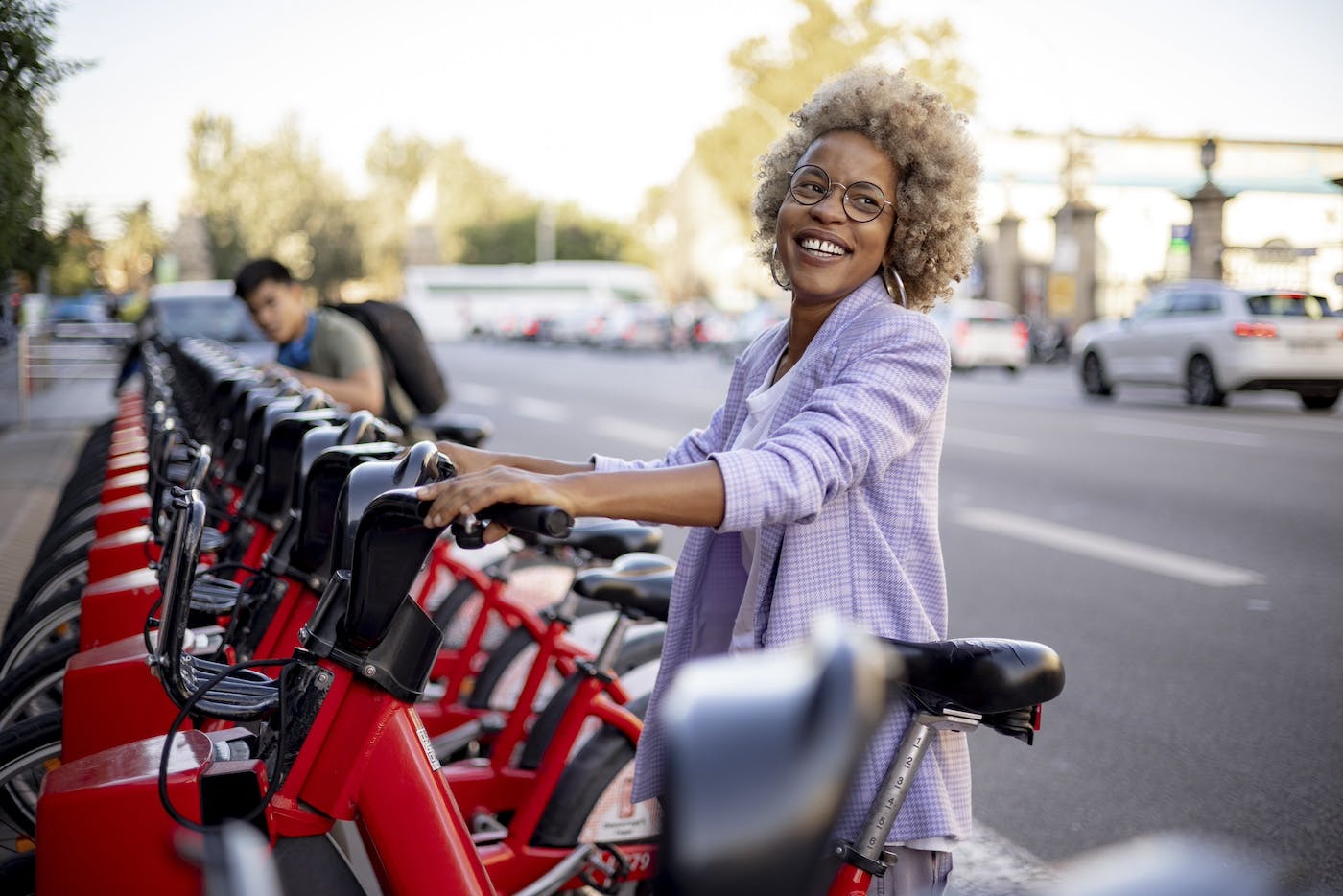NACTO’s 2023 Shared Micromobility Report Highlights Need for Partnerships and Public Investment
By: Odochi Akwani, Better Bike Share Partnership writer and content manager

Data from the U.S. and Canada shows how shared micromobility (SMM) ridership continues to increase despite challenges cities face in providing SMM as an essential service.
Last month, the National Association of City Transportation Officials (NACTO) released its 2023 Shared Micromobility Report, breaking down station-based bike share and dockless e-scooter and e-bike ridership in North America in 2023 while offering recommendations on how cities can plan for the long-term viability of their systems.
HIGHLIGHTS FROM THE 2023 REPORT
Surpassing the previous record set in 2019, more people took shared micromobility trips in 2023 than in any other year.
At 157 million, total shared micromobility (SMM) trips increased by 20% over 2022, far surpassing the 2019 peak of 147 million trips. In Canada, SMM trips increased by an impressive 40% with 24 million trips in 2023. In the U.S., 133 million trips were taken last year — up 16% from 2022.

Station-based bike usage continues to increase, driven by the growing popularity of e-bikes.
The U.S. saw a total of 61 million station-based bike share trips in 2023, up from 53 million in 2022. Station-based trips taken by electric bicycle (e-bike) increased from 20 million trips in 2022 to 28 million trips in 2023, a substantial 40% growth. E-bike trips represented 46% of all station-based bike share trips.
Canada saw a total of 20 million trips on station-based bikes in 2023, compared to 15 million in 2022. Differing from the U.S., this growth was largely due to station-based traditional (non-electric) bike rides. Canadians took 15 million trips on traditional bikes in 2023, increasing by nearly 40% from 2022.
Prices are rising, making shared micromobility more expensive compared to other public transit options, highlighting the need for accessible pricing models for every rider.
Shared micromobility riders often bear the brunt of paying sales tax on their trip, unlike other forms of public transportation. While income-based discounts offer substantial savings to those living below the federal poverty level, with the cost of living increasing for all, shared micromobility is moving further and further out of reach for working and middle class families.
Thankfully, the popularity of more-affordable annual or monthly pass options has significantly increased in recent years. Since 2019, annual pass sales have increased by 20% or more in places like Boston, Chicago, New York City, and Toronto.
Infrastructure that supports safe bike and scooter share riding leads to increased ridership.
It’s proven through research and practice that the build-out of connected and safe bike infrastructure motivates people to ride more. Cities that invest in safe bike infrastructure see the greatest increase in shared micromobility ridership year after year.
A study conducted in Hamilton, Ontario, showed that increases in bicycling were greatest on concrete-barrier-protected bike lanes and other protected infrastructure on arterial streets well connected to other protected biking routes.
Public funding is vital for keeping shared micromobility programs sustainable.
The existence of shared micromobility programs continues to be threatened by financial instability. Public funding, foundation support, and longer-term sponsorships are necessary for sustainable systems.
In the last few years, systems across the country (including Nice Ride in Minneapolis, Houston BCycle, RedBike in Cincinnati, and This Machine in Tulsa) have shut down because of a lack of sustainable funding. With these closures, it’s becoming abundantly clear that shared micromobility systems require dedicated public investment to provide stable, reliable service.
When bike share systems first launched, few places considered it to be a form of public transportation. Cities often relied on outside operators to fund these mobility options. Now, 15 years after the first bike share system opened in North America, shared micromobility is no longer an experiment — it's a proven and vital piece of many cities' transportation systems. Unfortunately, funding is still unstable in many places.
Shared micromobility is an essential transportation service. The Better Bike Share Partnership is taking this opportunity to highlight success stories and advocate for more support of bike and scooter share systems through increased public investment, the construction of safe and connected infrastructure, the creation of sustainable partnerships with system sponsors, and setting clear plans for long-term growth.
Last year, David Zipper highlighted the issue of expecting bike share to operate without subsidy in an article published in Fast Company. The North American Bike and Scooter Share Association has hosted webinars and industry conversations (which can be found here, here, and here) on the role local, state, and federal governments should play in funding shared micromobility. Now, we have NACTO’s 2023 report reinforcing these conversations by calling out that “it is more important than ever to secure sustainable funding models for shared micromobility programs.”
As ridership and popularity of shared micromobility only continues to grow, we must capitalize opportunities to stabilize bike and scooter share systems through sustained public investment and work with cities to safeguard the future of their shared micromobility systems.
You can access NACTO’s full 2023 report here.
The Better Bike Share Partnership is funded by The JPB Foundation as a collaboration between the City of Philadelphia, the National Association of City Transportation Officials (NACTO), and PeopleForBikes to build equitable and replicable bike share systems. Follow us on Facebook, Twitter, and Instagram, or sign up for our weekly newsletter.
Related Topics:
